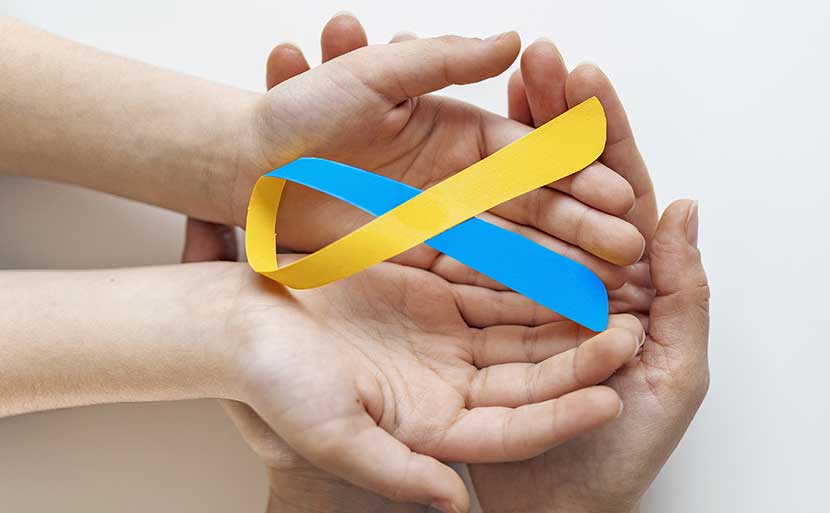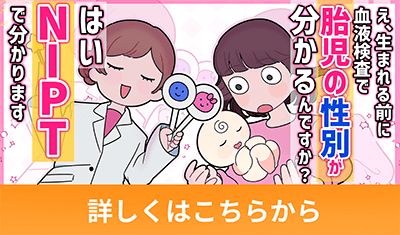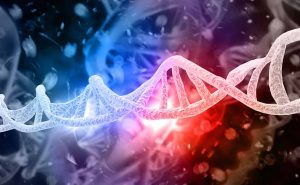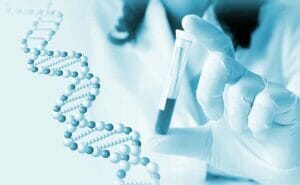Discover essential guidance on how to manage a diagnosis of Down syndrome in your newborn. Learn about early detection, medical care, and support strategies to ensure the best start for your baby.
- What is Down Syndrome?
- Facial Features of Down Syndrome
- Complications of Down Syndrome
- Intellectual Disability in Down Syndrome
- When Can Down Syndrome Be Detected by Ultrasound?
- Probability of Down Syndrome by Age
- Head Size of a Fetus with Down Syndrome
- Average Weight of a Fetus with Down Syndrome
- Ultrasound Images of a Fetus with Down Syndrome
- Mild Cases of Down Syndrome
- General Lifespan of Individuals with Down Syndrome
- Care for a Baby with Down Syndrome Right After Birth
- Conclusion
What is Down Syndrome?
Down syndrome is a disorder caused by abnormalities in the chromosomes, which contain the genes and DNA inherited from the parents.
Normally, 23 chromosomes are inherited from the father and 23 from the mother, for a total of 46 chromosomes. However, in Down syndrome, there is an extra copy of the 21st chromosome, leading to various intellectual and physical disabilities.
Down syndrome is a disorder that was described in 1866 and is named after Dr. Down, who reported it in a paper. Among chromosomal abnormalities, which occur due to abnormalities in the chromosomes, Down syndrome is considered one of the most common disorders. Its incidence rate is about 1 in 600 to 800 people.
However, as the mother’s age at childbirth increases, the likelihood of the baby having Down syndrome also rises. Additionally, if the mother has Down syndrome, the probability of the baby having Down syndrome is higher compared to a mother who does not have Down syndrome.
Facial Features of Down Syndrome
When Down syndrome occurs, characteristic facial features appear.
The main facial features of Down syndrome are as follows:
- Small head
- Broad, flat nose
- Slanted, narrow eyes
- Large tongue
- Excess skin at the back of the neck ,etc.
While not all facial features necessarily appear in every case of Down syndrome, there is a tendency for these characteristic facial features to develop.
In addition to facial features, physical characteristics include reduced muscle tone throughout the body, short fingers, and short stature. There is also a higher risk of obesity due to limited physical activity and dietary imbalances.
Complications of Down Syndrome
Individuals with Down syndrome may develop various complications. Approximately 50% have congenital heart disease, with ventricular septal defect and common atrioventricular canal being the most frequently occurring heart conditions.
Additionally, there is a high frequency of gastrointestinal complications, such as duodenal obstruction or stenosis, Hirschsprung’s disease (a neurogenic disorder of the intestines), and celiac disease (which causes malabsorption). Other potential systemic complications include hypothyroidism, diabetes, and thrombocytopenia.
In the past, individuals with Down syndrome were considered to have a short lifespan due to complications. However, with the advancement of medical treatments for complications associated with Down syndrome, the average life expectancy has increased to around 60 years, with some individuals living into their 70s and 80s.
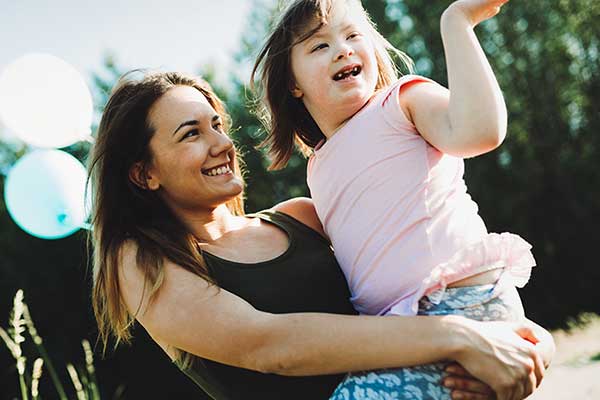
Intellectual Disability in Down Syndrome
Many individuals with Down syndrome experience intellectual disabilities along with various physical symptoms.
The degree of intellectual disability ranges widely, from mild intellectual disabilities with an IQ of around 50–75 to severe intellectual disabilities with an IQ of around 20–35. Additionally, there may be issues such as lack of attention, hyperactivity, and autistic behaviors, with the latter being more common in individuals with more pronounced intellectual disabilities. It is also characterized by a higher risk of developing depression.
Individuals with Down syndrome experience delays in intellectual development compared to their peers due to intellectual disabilities. However, despite the delays, they continue to develop, making it important to provide support tailored to their pace.
When Can Down Syndrome Be Detected by Ultrasound?
It is possible to detect the likelihood of a fetus having Down syndrome through an ultrasound examination using sonography.
The likelihood of detecting Down syndrome through an ultrasound examination is said to be around 11 weeks or later. This is because the fetus needs to have grown to a certain extent for the characteristics of Down syndrome to be noticeable.
The features of Down syndrome that can be detected through an ultrasound examination include swelling at the back of the head or neck, the growth degree of the nasal bone, and blood flow issues in the heart.
However, an ultrasound examination does not confirm Down syndrome. Therefore, if an ultrasound suggests a possibility of Down syndrome, additional tests are required to confirm the diagnosis.
Probability of Down Syndrome by Age
Down syndrome is characterized by an increased likelihood of occurrence as the mother’s age at childbirth increases.
Below, we introduce the likelihood of Down syndrome by age.
| Mother’s Age | Probability of Having a Baby with Down Syndrome | Mother’s Age | Probability of Having a Baby with Down Syndrome |
|---|---|---|---|
| 20 | 1 in 1,667 (0.06%) | 43 | 1 in 50 (2%) |
| 25 | 1 in 1,250 (0.08%) | 44 | 1 in 38 (2.63%) |
| 30 | 1 in 952 (0.11%) | 45 | 1 in 30 (3.33%) |
| 35 | 1 in 385 (0.26%) | 46 | 1 in 23 (4.35%) |
| 40 | 1 in 106 (0.94%) | 47 | 1 in 18 (5.56%) |
| 41 | 1 in 82 (1.22%) | 48 | 1 in 14 (7.14%) |
| 42 | 1 in 64 (1.56%) | 49 | 1 in 11 (9.09%) |
As shown, as the mother’s age increases, the probability of having a baby with Down Syndrome also increases, according to reports.
In addition, the probability of developing other chromosomal abnormalities, not just Down Syndrome, also increases.
Head Size of a Fetus with Down Syndrome
Fetuses with Down Syndrome tend to have larger heads compared to fetuses without Down Syndrome.
Measuring the Biparietal Diameter (BPD), which is the width of the skull, and the Front Occipital Diameter (FOD), which is the length of the skull, if these measurements are larger than average, there may be a suspicion of Down Syndrome.
Average Weight of a Fetus with Down Syndrome
Fetuses with Down Syndrome tend to have a lower average weight compared to fetuses without Down Syndrome. There is no official data published on the average weight of fetuses with Down Syndrome, so specific average weights are not known.
However, according to data from a certain hospital, the average birth weight for babies with Down Syndrome was reported to be 2,620 grams. Given that the average birth weight of babies in Japan is about 3,000 grams, it can be said that the average weight of fetuses with Down Syndrome is somewhat lighter.
Ultrasound Images of a Fetus with Down Syndrome
The ultrasound images of fetuses with Down Syndrome often show the characteristic physical findings commonly associated with Down Syndrome, as previously mentioned.
Ultrasound imaging is typically performed during routine prenatal check-ups, so it is generally not the case that you would go through your pregnancy without having any scans.
Ultrasound uses sound waves to create images, and the examination involves simply placing a probe on the abdomen to assess the fetus’s condition. Unlike X-rays, it does not involve radiation exposure, making it a safe procedure.
Clearly Visible Down Syndrome at 9 Months Pregnant
By around the 9th month of pregnancy, the fetus’s body functions have developed significantly, and the baby is nearly in its birth form. It becomes easier to assess features such as the eyes, nose, and head shape. Therefore, ultrasound images taken around the 9th month of pregnancy may clearly show the characteristics of Down Syndrome.
Mild Cases of Down Syndrome
Down Syndrome can be further classified into the following three types:
- Standard Type
- Translocation Type
- Mosaic Type
Among these, the mosaic type of Down Syndrome accounts for 1-2% of all Down Syndrome cases, and it is often associated with milder symptoms.
Characteristics of Down Syndrome in its milder forms include less severe intellectual and physical disabilities, as well as a lower risk of complications compared to more severe cases of Down Syndrome. Due to the relatively minor impact of the disabilities, some individuals with Down Syndrome can lead independent lives within general society.
General Lifespan of Individuals with Down Syndrome
The typical lifespan for individuals with Down Syndrome is currently reported to be around 60 years.
Previously, individuals with Down Syndrome had a shorter lifespan due to complications. However, with advancements in treatment techniques, their lifespan has significantly increased over the past 20 to 30 years.
Therefore, it is not uncommon for adults with Down Syndrome to live and integrate into society.

Care for a Baby with Down Syndrome Right After Birth
Immediately after birth, it is sometimes not recognized that a baby has Down Syndrome.
If you notice any unusual signs, such as low muscle tone in the baby or prolonged feeding times, it is important to inform your doctor.
Down Syndrome requires attention not only for intellectual and physical symptoms but also for potential complications.
As care for a newborn with Down Syndrome starts right after birth, it is important to monitor the baby’s changes and receive appropriate support from medical institutions.
If your child is diagnosed with Down Syndrome, you may initially feel anxious. However, in some respects, Down Syndrome can be viewed as a unique characteristic. It is important to provide appropriate care and nurture them with love.
Conclusion
This time, we explained how to approach and support a baby with Down Syndrome.
It is natural to feel anxious or overwhelmed when suddenly informed that your child has Down Syndrome. Without understanding what Down Syndrome is, it can be challenging to address the situation appropriately. Therefore, it is important to learn about what Down Syndrome entails.
Additionally, Down Syndrome can be detected before birth through NIPT (Non-Invasive Prenatal Testing). While it is not a definitive diagnosis, after confirming the pregnancy with an ultrasound, there is a high likelihood that NIPT can identify whether the fetus has Down Syndrome.
If you wish to check whether your baby may have Down Syndrome or any other chromosomal abnormalities, please feel free to contact Hiro Clinic NIPT.
【Reference】
- MSD Manual – Down Syndrome (Trisomy 21)
- Ministry of Health, Labour and Welfare – Living with Trisomy 21
- Children’s Chronic Specific Disease Information Center – Down Syndrome
- Ministry of Health, Labour and Welfare – “Study Group on the State of Specific Treatment Support Projects for Infertility Issues”
Discover essential guidance on how to manage a diagnosis of Down syndrome in your newborn. Learn about early detection, medical care, and support strategies to ensure the best start for your baby.
Article Editorial Supervisor
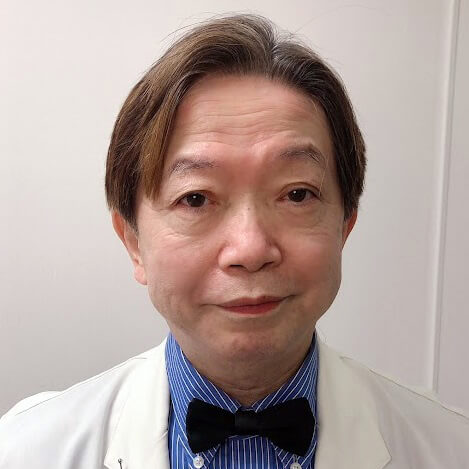
Dr. Masahiko Ito
Former Professor, University of Health and Welfare, Former Dean, Kashiwa Rehabilitation School, University of Medical Innovation, Member, Japanese Society for Gene Therapy and Japanese Society for Gene Research, etc.
Brief History
1974 – Entered the National Defense Medical College
1979 – Externship at the Department of Pediatrics, Faculty of Medicine, University of Sydney, Australia (Royal Alexandria Children’s Hospital)
1980 – Graduated from National Defense Medical College (1st class). Joined the Department of Pediatrics, National Defense Medical College
Worked at the Department of Pediatrics, National Defense Medical College Hospital, Self Defense Forces Central Hospital, Department of Neonatology, Hokkaido General Health Center for Children, and Mishuku Hospital of the National Public Service Mutual Aid Union
1989 – Research Fellow, Harvard Medical School, USA; Clinical Fellow, Tufts University School of Medicine, USA
1993 – Lecturer of Pediatrics, Saitama Medical College Junior College of Saitama Medical School
1994 – Lecturer of Pediatrics, Saitama Medical College
1997 – Associate Professor of Pediatrics, International University of Health and Welfare, Japan, working in the Department of Pediatrics, Sanno Hospital, Japan
2006 – Special Appointment Professor of Pediatrics, International University of Health and Welfare, International University of Health and Welfare (Pediatrics)
2008 – Honorary Director of Ihatove Hospital (Iwate Rosai Hospital)
2009 – Chairman, Hasuda Yotsuba Hospital, Kokoro no Kizuna Medical Corporation
2010 – Chairman, Ginza Cosmetic Surgery Clinic, Ginbikai Medical Corporation
2011 – Director of Shinkawa Hospital, Tsuruyokai Medical Corporation
2011 – Director of Chiba-Kashiwa Rehabilitation School of Medical Sosei University Educational Corporation
2014 – Director, Niigata Chuo Dialysis Clinic, Aoi Kai Medical Corporation
2016 – Deputy Director, Niigata Seiro Hospital, Aoi Kai Medical Corporation
2017 – Director, Higashi Katsushika Hospital, Fukujukai Medical Corporation
2018 – Director of International Department, AOI International Hospital, Aoi Kai Medical Corporation
Certifications
Doctor of Medicine
Registered as a care support specialist (Care Manager)
Board Certification in Allergology, Japanese Society of Allergology
Certified Industrial Physician by the Japan Medical Association
Board Certification in Pediatrics, Japan Pediatric Society
Passed the Japanese Society of Laser Medicine Medical Specialist Examination
Councilor of the Japanese Society of Pediatric Allergy
Councilor, Japanese Society of Pediatric Psychosomatic Medicine
Councilor, Japan-U.S. Medical Exchange Foundation
Councilor, Japan Internet Medical Association
Board member of the Japan Society for Computer Science
Chairman of the Board of Directors, Nightingale Spirit League
Chairman of the Board of Directors, NPO Defense Health Career Net
Advisor to the Medical Department of Kurokane Prison, Ministry of Justice, and other positions or activities
 中文
中文





